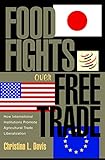Food Fights over Free Trade : How International Institutions Promote Agricultural Trade Liberalization / Christina L. Davis.
Material type: TextPublisher: Princeton, NJ : Princeton University Press, [2011]Copyright date: ©2003Edition: Course BookDescription: 1 online resource (416 p.) : 9 line illus. 27 tablesContent type:
TextPublisher: Princeton, NJ : Princeton University Press, [2011]Copyright date: ©2003Edition: Course BookDescription: 1 online resource (416 p.) : 9 line illus. 27 tablesContent type: - 9780691122540
- 9781400841394
- 382.41 382.41 382/.41
- HD1761
- online - DeGruyter
- Issued also in print.
| Item type | Current library | Call number | URL | Status | Notes | Barcode | |
|---|---|---|---|---|---|---|---|
 eBook
eBook
|
Biblioteca "Angelicum" Pont. Univ. S.Tommaso d'Aquino Nuvola online | online - DeGruyter (Browse shelf(Opens below)) | Online access | Not for loan (Accesso limitato) | Accesso per gli utenti autorizzati / Access for authorized users | (dgr)9781400841394 |
Frontmatter -- Contents -- Figures -- Tables -- Acknowledgments -- Abbreviations -- 1. Introduction -- Part I: NEGOTIATION STRUCTURE AND TRADE LIBERALIZATION -- 2. Framework for Analysis of Negotiations -- 3. Patterns of Agricultural Liberalization -- Part II: U.S.-JAPAN TRADE NEGOTIATIONS -- 4. Farm Politics in Japan -- 5. Legal Framing and Quota Policies -- 6. Linkages in Comprehensive Negotiations -- Part III: U.S.-EU TRADE NEGOTIATIONS -- 7. Farm Politics in the European Union -- 8. Two Rounds of Negotiating CAP -- 9. Battles over Beef -- Part IV: CONCLUSION -- 10. Comparative Perspectives -- Appendix: Descriptive Statistics -- Bibliography -- Index
restricted access online access with authorization star
http://purl.org/coar/access_right/c_16ec
This detailed account of the politics of opening agricultural markets explains how the institutional context of international negotiations alters the balance of interests at the domestic level to favor trade liberalization despite opposition from powerful farm groups. Historically, agriculture stands out as a sector in which countries stubbornly defend domestic programs, and agricultural issues have been the most frequent source of trade disputes in the postwar trading system. While much protection remains, agricultural trade negotiations have resulted in substantial concessions as well as negotiation collapses. Food Fights over Free Trade shows that the liberalization that has occurred has been due to the role of international institutions. Christina Davis examines the past thirty years of U.S. agricultural trade negotiations with Japan and Europe based on statistical analysis of an original dataset, case studies, and in-depth interviews with over one hundred negotiators and politicians. She shows how the use of issue linkage and international law in the negotiation structure transforms narrow interest group politics into a more broad-based decision process that considers the larger stakes of the negotiation. Even when U.S. threats and the spiraling budget costs of agricultural protection have failed to bring policy change, the agenda, rules, and procedures of trade negotiations have often provided the necessary leverage to open Japanese and European markets. This book represents a major contribution to understanding the negotiation process, agricultural politics, and the impact of international institutions on domestic politics.
Issued also in print.
Mode of access: Internet via World Wide Web.
In English.
Description based on online resource; title from PDF title page (publisher's Web site, viewed 29. Jul 2021)


